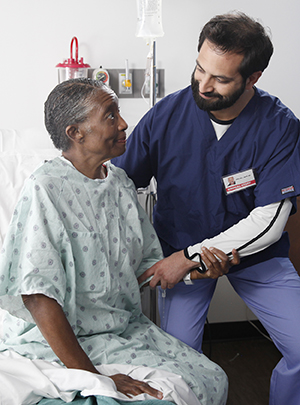Healing takes time. How much time depends on your health and the type of surgery you had. During that time, you can do a lot to make sure that you regain your health and energy.
Walking after surgery
You may be surprised at how soon you are urged to get up and walk. Walking lowers the risk of blood clots and breathing problems.
What to expect after surgery
For the first days after surgery, here is what you can expect:
-
The abdominal incision may be closed with stitches or staples. It is sometimes covered with gauze.
-
Pain can be relieved with medicine prescribed by your healthcare provider.
-
You may need a catheter to help you urinate. It's put in your bladder during surgery. In most cases, it is taken out 1 day to 2 days after surgery.
-
You may have some vaginal staining. You may need to use sanitary pads. Don't use tampons.
-
Meals may be limited to liquids until your bowels are back to normal.
-
Your lungs need to be kept clear of excess fluid. This prevents problems such as pneumonia. You will be shown how to clear your lungs.
Take care of yourself physically
To help your body heal, follow these tips:
-
Take showers instead of baths.
-
Don't use tampons or douches. They can cause the vagina to become infected.
-
Don't have sex for as long as your healthcare provider advises.
-
To prevent constipation, eat fruits, vegetables, and whole-grain foods. Drink at least 8 glasses of fluid each day.
-
Increase activity gradually as instructed by your surgeon. Don't do tasks or movements that can strain your incision, such as lifting.
-
Tell family and friends how they can help.
Take care of yourself emotionally
Having a hysterectomy may affect your emotions. You may be relieved to no longer have symptoms. But you may feel "down" about the changes in your body. You may also have mood swings if your ovaries were removed and you hadn't yet reached menopause. To feel better, take any medicines prescribed by your healthcare provider. Also be sure to tell your healthcare provider how you feel.
Featured in


